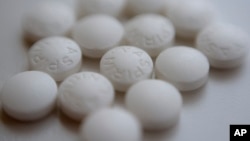From VOA Learning English, this is the Health & Lifestyle report.
Many people take aspirin to help ease pain in the head or muscles. But there is another use for this pain-relieving medicine. Aspirin is often used as a blood thinner since it costs less than other treatments.
Some doctors advise patients who have suffered a heart attack, stroke or other heart problems to take a small amount of aspirin every day.
Doctor Holly Andersen is a heart specialist with the New York-Presbyterian/Weill Cornell Medical Center in New York City.
"It's clear that people who have had heart attacks, or most strokes, can benefit from taking a baby aspirin every day. It's very important. It reduces your future risk of stroke, heart attack and can make you live longer."
Experts at the European Society of Cardiology agree.
They wrote in a statement, “The benefit of aspirin for preventing a second heart attack or stroke is well established. Its use for preventing first events is controversial.” The experts go on to say that warnings against using aspirin come from an “increased risk of major bleeding.”
Now, major research has tested whether aspirin can help to prevent a first-time heart problem. Results from two large studies found that it cannot.
Boston study
A new American study involved more than 12,000 patients. They were all at moderate risk of a heart problem because of other issues, like high blood pressure, high blood cholesterol or smoking. These patients showed no improvement after taking aspirin.
Financing for this study came from the German drug company Bayer, which manufactures aspirin. Lead researcher J. Michael Gaziano spoke about the findings.
"Risk that a person has, changes over time and some of that change is due to some of the things that we do like managing their risk factors and then taking care of them when they develop symptoms."
Dr. Gaziano works at Brigham and Women’s Hospital in Boston, Massachusetts. A report on the study notes that he is a member of the Scientific Advisory Board for the International Aspirin Foundation. On the group’s website, he states that he has received money from Bayer.
Oxford study
The other new aspirin-related study comes from the University of Oxford in Britain. It involved more than 15,000 adults with Type 1 or Type 2 diabetes. Other than this condition, these men and women were generally in good health and had no history of heart disease.
Researchers ordered the subjects to take either aspirin, fish oil, both aspirin and fish oil, or a placebo – a harmless substance -- every day.
After 7½ years, the aspirin users had fewer heart problems than the other subjects. But they also had more cases of serious internal bleeding. Researchers say these adults simply traded one risk for another.
The lead investigator was Jane Armitage of the University of Oxford.
"We also saw almost a 30 percent increased risk in major bleeding. So, that was bleeding bad enough to get you into hospital. Mainly from the gut, or bleeding into the eye or brain and if it was in to the eye, it was bad enough to threaten your sight."
Financing for this study came mainly from the British Heart Foundation. The findings were announced last week at the European Society of Cardiology Congress in Munich, Germany.
At that meeting, Dr. Armitage was asked about the possible health risks of taking aspirin. She told the Associated Press, ‘‘If you’re healthy, it’s probably not worth taking it.’’
And that’s the Health & Lifestyle report.
I’m Anna Matteo.
Faith Lapidus reported on this story for VOANews. Anna Matteo adapted the report for Learning English with additional materials. George Grow was the editor.
_________________________________________________________________
__________________________________________________________________
Words in This Story
benefit – n. something that produces good or helpful results or effects or that promotes well-being
baby aspirin – medical n. A popular term for a type of aspirin that contains 81 mg or less of aspirin and is used to reduce blood clotting.
cardiology – n. the study of the heart and of diseases that affect the heart
controversial – adj. relating to or causing much discussion, disagreement, or argument : likely to produce controversy
manage – v. to keep (something) under your control
factor – n. something that helps produce or influence a result : one of the things that cause something to happen
symptom – n. a change in the body or mind which indicates that a disease is present
gut – n. the internal organs of an animal






